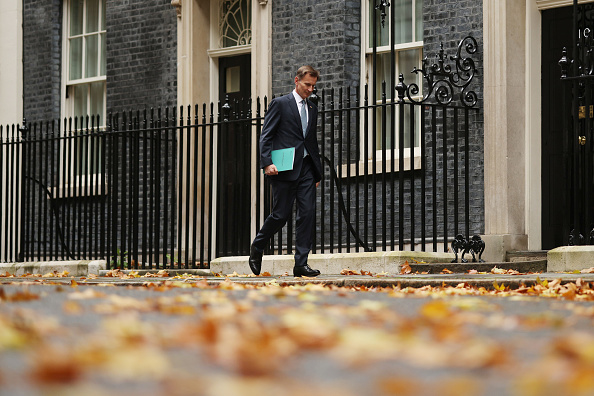Hunt targets highest earners in tax grab as chancellor raises £55bn

The UK’s highest earners have been targeted as a part of Jeremy Hunt’s tax grab, with the top 45p threshold of Income Tax slashed.
The top tax bracket has been reduced from £150,000 to £125,140, while he has also frozen the Income Tax thresholds for the two lower brackets in a stealth hike.
Hunt announced that he would raise £55bn in his autumn fiscal statement through a mixture of spending cuts and tax hikes, which he said was necessary “to tackle inflation and keep mortgage rises down”.
The changes will see income tax payers forced to fork over hundreds more pounds a year to the taxman.
It comes as today the Office for Budget Responsibility (OBR) says the UK is already in a recession and that living standards will “fall 7 per cent over two years, wiping out eight years’ growth”.
The chancellor froze the main National Insurance thresholds and the inheritance tax thresholds for a further two years as a part of the tax grab.
Businesses also face an increase in National Insurance Contributions, with the employer threshold frozen until 2028.
The dividend allowance will be slashed from £2,000 to £500, while the capital gains tax allowance will be slashed from £12,300 to £3,000.
HW Fisher, an accountancy firm, said Hunt was “crushing entrepreneurial spirit” with these tax hikes.
The UK’s windfall tax on energy producers’ profits has been extended until 2028 and has been increased from 25 per cent to 35 per cent. Electricity generators will also now be included and pay a 45 per cent rate, with both measures set to raise £14bn next year.
The chancellor said “we ask those with more to contribute more”, but that “we avoid the tax rises that most damage growth”.
“The furlough scheme, the vaccine rollout, and the response of the NHS did our country proud – but they all have to be paid for,” he said.
Referencing Liz Truss and Kwasi Kwarteng’s mini-Budget, which led to a surge in UK government borrowing costs, Hunt said: “Unfunded tax cuts are as risky as unfunded spending which is why we reversed the planned measures quickly.”
Whitehall departments were told they would have to make “efficiencies to deal with inflationary pressures in the next two years”, while difficult decisions on spending cuts were deferred until after 2024.
The NHS’ budget has been protected, however the chancellor warned that other “departments will have to make efficiencies to deal with inflationary pressures in the next two years”.
The state pension will still increase by inflation next year as the pension triple lock has been kept in place, while benefits will also increase in line with inflation.
The government’s energy price cap will see average energy household bills rise from £2,500 to £3,000 from next April, with further help for the most vulnerable.
There were pre-statement rumblings in Westminster that the right of the Tory party would rebel against the expected tax hikes when they come to a vote next year.
One senior Tory MP said Hunt and Rishi Sunak “have killed the concept or argument of a Conservative way of an economy”.
When asked about a potential rebellion, they said: “By April, if MPs are seeing real hardship and real problems and an economy deeper into recession then I think all bets are off.”
Another Tory MP said “most backbenchers have been relatively relieved” by the scale of the package, after spending cuts were more muted than expected.
The chancellor’s statement has been savaged by business groups, with the Federation of Small Businesses calling it “high on stealth tax-creation and low on wealth-creation.
“While tackling inflation is essential, so are measures to create conditions for prosperity, growth and support enterprise. Today is a missed opportunity to avoid further economic slowdown,” FSB chair Martin McTague said.